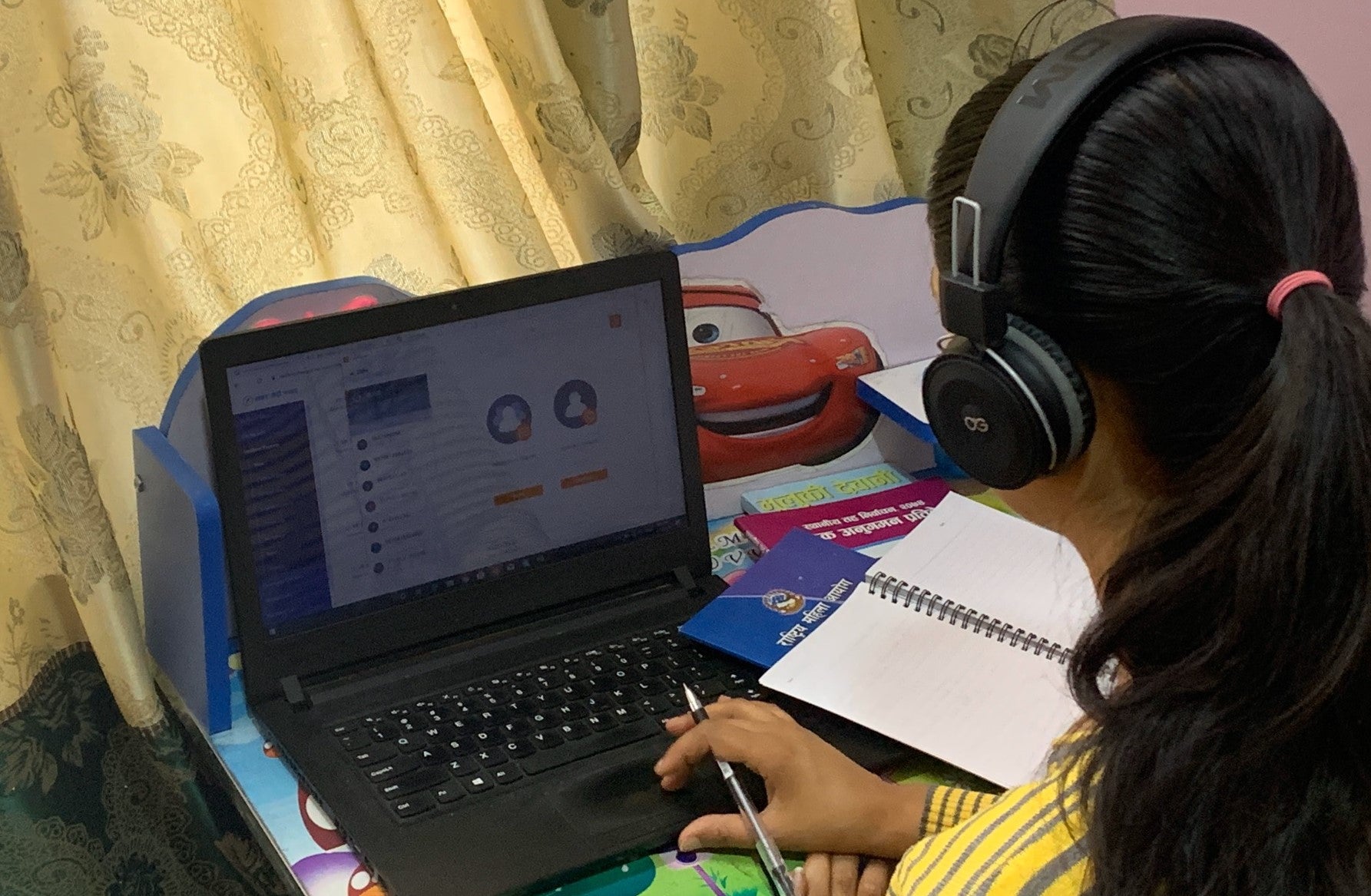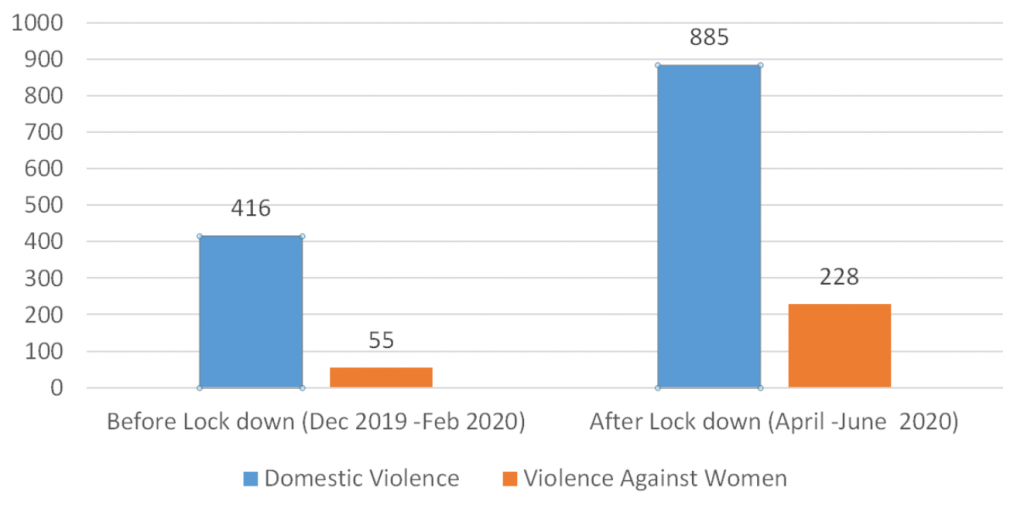 A helpline officer at work
A helpline officer at work
After 25 years of abuse, Reeta*, finally mustered up the courage, picked up her mobile phone and called 1145 for help. Reeta could no longer tolerate repeated physical abuse by her husband who had become increasingly violent since March 24 – the day Nepal went into lockdown due to the COVID-19 pandemic. Seeking a safe place posed a challenge for Reeta as her house is a five-hour walk from the main road.
Nepal was one of the first South Asian countries to implement the lockdown to keep people safe in their homes, but for Reeta and many more like her, it proved just the opposite. While staying home prevented them from contracting coronavirus, survivors of gender based violence (GBV) faced a different kind of ‘shadow pandemic’.
Violence against women and girls, particularly domestic violence, has intensified globally since the COVID-19 outbreak. A UN report estimates that if the lockdown continues for six months, 31 million additional gender-based violence cases can be expected worldwide. This number will likely increase due to security, health, and financial concerns amplified by the pandemic.
Violence against women and girls, particularly domestic violence, has intensified globally since the COVID-19 outbreak.
Nepal, with an already high prevalence of GBV, saw a rise in domestic violence cases during the lockdown. A 24 hour toll-free helpline run by Nepal’s National Women Commission (NWC) received 885 calls related to domestic violence from April to June, 2020. This is over twice the number of calls received within the same period prior to the lockdown (Dec 2019 – Feb 2020). With perpetrators locked in with survivors at all times, there could be many more who have not been able to call or reach out for help.
The helpline, Khabar Garaun (Inform Us), has been instrumental in providing first-hand remote support to survivors of GBV during the lockdown as many referral services are not functional. Supported by the World Bank under the Integrated Platform for Gender Based Violence Prevention and Response (IPGBVPR) project since 2017, the helpline works as a comprehensive system that manages calls, provides psychosocial and legal counselling and shelter services depending on callers’ individual needs. Since its inception, the helpline has provided 11,922 integrated services to 17,821 clients. Supported by the World Bank’s State and Peace Building Fund under the Integrated Platform for Gender Based Violence Prevention and Response (IPGBVPR) project since 2017, the helpline works as a comprehensive system that manages calls, provides psychosocial and legal counselling and shelter services depending on callers’ individual needs. Since its inception, the helpline has provided 11,922 integrated services to 17,821 clients.
Remote support during lockdown
The nationwide lockdown changed the order of business for the helpline. Face-to-face services were replaced with remote teleservices and referrals, and during psychosocial counselling, visual cues were replaced with active listening.
Once Reeta called in, she started receiving regular psychosocial counselling over the phone where she learnt stress management skills and safety planning. “After a few sessions, she said she was pleased to find a true friend and a confidante in me,” says Reeta’s psychosocial counsellor at NWC. “Reeta is now aware of her legal rights, she has a safety plan, and is ready to call the police if she chooses to do so. She is also well informed that it is entirely up to her how and who she wants to reach out for help. I am glad to see that level of confidence in her.”
Adapting to the new reality
The responsibilities of the helpline staff grew with the surge in calls during the lockdown. To help them adapt to the new reality with first-hand skills and better managed self-care routines, the project team designed and conducted online trainings for helpline staff including helpline officers, psychosocial and legal officers.
The training helped the team feel better connected to each other while strengthening first-line survivor support skills and active listening and responding skills.
The COVID-19 pandemic also brought additional challenges in service provision. For instance, while psychosocial and legal counselling could be provided over the phone, services that required physical presence like shelter and health needed to be adjusted to the new working environment. In the absence of proper guidelines, shelter homes were not sure how to accommodate new survivors as the fear of contracting the virus was rampant.
Keeping this in mind, the team launched rapid assessments to understand how shelter and health services could be tailored to the current situation and produced shelter and health protocols in consultation with relevant stakeholders and government agencies. These important protocols provide clear guidance for GBV services providers, and has now been approved by the Ministry of Women, Children and Senior Citizen, and operationalized nationally.
Leaving no one behind
The Government of Nepal has recently announced through its programs and policies to work towards leaving no one behind and developing gender responsive programs for a just society, including eliminating all forms of social discrimination, exploitation and violence against women. In this scenario, the experience of the NWC helpline can set a good precedent on how multi-sectoral response mechanisms can support the government in achieving its goals. However, it is essential to institutionalize and build-in the platform at the local levels by investing adequate resources, establishing service mechanisms, and by boosting outreach.
The shelter and health protocols provide clear guidance for GBV services providers, and has now been approved by the Ministry of Women, Children and Senior Citizen, and operationalized nationally.
The COVID-19 pandemic has not only disrupted efforts to address GBV issues, it has also magnified the reality and challenges around it. This is the right time to prioritize and integrate helpline services throughout Nepal to support thousands of GBV survivors in need.
* Name changed to protect privacy.




Join the Conversation